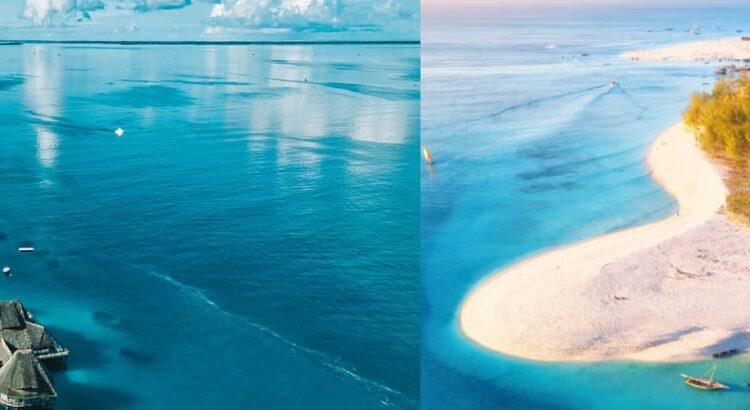Zanzibar, an enchanting jewel off the eastern coast of Africa, beckons travelers with its intoxicating blend of history, culture, and natural beauty. This semi-autonomous archipelago, part of Tanzania, is renowned for its pristine beaches, vibrant markets, and rich Swahili heritage.
Located in the warm waters of the Indian Ocean, Zanzibar comprises several islands, with Unguja and Pemba being the largest and most visited. The allure of Zanzibar lies not only in its stunning tropical landscapes but also in its fascinating history, shaped by centuries of trade and cultural exchange.
The history of Zanzibar is intertwined with the spice trade, which once made it a hub of commerce in the Indian Ocean region. Arab, Persian, Indian, and European traders traversed its shores, leaving behind a legacy that is evident in its architecture, cuisine, and people. The island’s strategic location also made it a center for the slave trade, a dark chapter in its past that is remembered and commemorated in various museums and monuments.
At the heart of Zanzibar’s history is Stone Town, a UNESCO World Heritage Site and the historic center of Zanzibar City. Its narrow streets are lined with ancient buildings adorned with intricately carved wooden doors, reminiscent of a bygone era. Visitors can wander through its labyrinthine alleys, immersing themselves in the sights, sounds, and smells of this vibrant cultural hub.
Zanzibar’s natural beauty is equally captivating. The island boasts powdery white beaches fringed by swaying palm trees, where turquoise waters lap gently against the shore. Snorkeling and diving enthusiasts are drawn to the rich marine life that thrives in the coral reefs surrounding the islands, while inland, lush forests and spice plantations invite exploration.
For those interested in wildlife, Zanzibar offers opportunities to encounter unique species, such as the endangered red colobus monkey found in the Jozani-Chwaka Bay National Park. Birdwatchers will delight in the diverse avian species that inhabit the island, from colorful sunbirds to majestic birds of prey.
Zanzibar’s culinary scene is a reflection of its multicultural heritage, blending flavors and spices from Africa, Arabia, Persia, and India. Visitors can sample a variety of dishes, from aromatic biryanis and succulent seafood to flavorful curries and street food delights like Zanzibar pizza and samosas.
As the sun sets over the Indian Ocean, Zanzibar comes alive with a vibrant nightlife scene. Visitors can enjoy live music, dance performances, and beachfront bonfires, or simply unwind with a cocktail while watching the stars twinkle overhead.
In summary, Zanzibar Africa is a destination that captivates the imagination and leaves a lasting impression on all who visit. With its rich history, stunning landscapes, and warm hospitality, it is a place of endless discovery and enchantment.
How to get there
Getting to Zanzibar, Africa, typically involves a combination of air and sea travel, depending on your starting point. Here’s a general overview of how to reach this enchanting destination:
- By Air:
- International Flights: Most travelers arrive in Zanzibar by flying into Abeid Amani Karume International Airport (ZNZ), located on Unguja Island, the main island of the Zanzibar archipelago. There are direct flights to Zanzibar from several major cities in Africa, Europe, and the Middle East, including Nairobi, Dar es Salaam, Addis Ababa, Dubai, Doha, Istanbul, and Amsterdam.
- Domestic Flights: If you’re already in Tanzania, you can also reach Zanzibar by taking a domestic flight from Dar es Salaam or other airports in Tanzania. Domestic airlines like Precision Air, Coastal Aviation, and Auric Air operate regular flights to Zanzibar.
- By Sea:
- Ferries: If you’re in Tanzania, you can also reach Zanzibar by ferry from Dar es Salaam. The ferry ride typically takes around 1.5 to 2 hours, depending on the type of ferry you choose. The most popular ferry operators are Azam Marine & Coastal Fast Ferries and Sea Star Marine, offering both standard and high-speed ferry services.
- Cruise Ships: Occasionally, cruise ships include Zanzibar as a port of call on their itineraries. If you’re cruising in the Indian Ocean region, you might have the opportunity to visit Zanzibar as part of your cruise experience.
- Visa Requirements:
- Make sure to check the visa requirements for entering Tanzania and Zanzibar based on your nationality. Some travelers may be eligible for visa-free entry or visa-on-arrival, while others may need to obtain a visa in advance.
- Transportation on the Island:
- Upon arrival in Zanzibar, you’ll find various transportation options to reach your accommodation or explore the island. Taxis, private transfers, and rental cars are available at the airport and ferry terminals. Additionally, many hotels and resorts offer airport transfers for their guests.
- Within Zanzibar, you can also get around by dala-dalas (shared minibuses), taxis, and motorbike taxis (known as “piki-pikis”). Some visitors also choose to rent bicycles or scooters to explore the island at their own pace.
Whether you arrive by air or sea, the journey to Zanzibar promises to be the beginning of an unforgettable adventure filled with culture, history, and natural beauty.
Things to do
Zanzibar, Africa, offers a myriad of experiences and activities that cater to every traveler’s interests. From cultural explorations to thrilling adventures and tranquil escapes, here are some of the top things to do in Zanzibar:
- Explore Stone Town: Wander through the narrow streets of Stone Town, a UNESCO World Heritage Site, and immerse yourself in its rich history and culture. Visit historical landmarks such as the Sultan’s Palace, the Old Fort, and the House of Wonders. Don’t miss the bustling markets, like Darajani Market, where you can sample local spices, fruits, and crafts.
- Relax on Pristine Beaches: Zanzibar is renowned for its breathtaking beaches with powdery white sand and crystal-clear turquoise waters. Spend leisurely days sunbathing, swimming, or indulging in water sports like snorkeling, diving, kite surfing, and sailing. Some popular beaches include Nungwi, Kendwa, Paje, and Jambiani.
- Take a Spice Tour: Discover the island’s rich agricultural heritage with a spice tour. Explore spice plantations where you’ll learn about the cultivation and harvesting of cloves, vanilla, cinnamon, nutmeg, and other spices. Engage your senses as you smell, taste, and touch various spices, and gain insights into their culinary and medicinal uses.
- Visit Jozani Forest: Embark on a guided tour of Jozani-Chwaka Bay National Park, home to the endangered red colobus monkey. Trek through the lush forest and observe these playful primates in their natural habitat. Keep an eye out for other wildlife, such as Sykes’ monkeys, bushbabies, and an array of bird species.
- Experience Sunset Dhow Cruises: Sail into the sunset aboard a traditional wooden dhow, a symbol of Zanzibar’s maritime heritage. Enjoy panoramic views of the coastline as you glide across the Indian Ocean. Some dhow cruises offer live music, fresh seafood dinners, and opportunities for swimming or snorkeling in secluded spots.
- Explore Prison Island: Take a boat trip to Prison Island (Changuu Island), located just off the coast of Stone Town. Visit the historical prison ruins and encounter giant Aldabra tortoises, some of which are over a century old. Relax on the island’s sandy beaches and snorkel in the surrounding coral reefs.
- Sample Swahili Cuisine: Indulge in Zanzibar’s diverse culinary delights, influenced by Arab, Indian, and African flavors. Taste local specialties such as Zanzibar biryani, seafood curries, grilled mishkaki skewers, chapati bread, and samosas. Don’t forget to try the refreshing sugar cane juice and tropical fruits like mangoes, coconuts, and pineapples.
- Visit Pemba Island: Take a day trip or overnight excursion to Pemba Island, Zanzibar’s lesser-known sister island. Explore its lush landscapes, pristine beaches, and vibrant coral reefs. Engage in activities such as snorkeling, scuba diving, kayaking, and hiking through the island’s scenic terrain.
- Attend Cultural Performances: Experience the vibrant rhythms and dances of Zanzibar’s cultural heritage. Attend traditional Taarab music concerts, where melodious Swahili tunes are accompanied by lively percussion instruments. You can also watch Ngoma performances featuring energetic drumming, acrobatics, and storytelling.
- Relish Sunset Beach Dining: Enjoy romantic beachfront dining experiences as you watch the sun dip below the horizon. Many resorts and beachside restaurants offer candlelit dinners with fresh seafood, barbecue grills, and bonfires set against the backdrop of the ocean.
These activities offer just a glimpse of the diverse experiences awaiting visitors in Zanzibar. Whether you’re seeking adventure, relaxation, or cultural immersion, Zanzibar promises to enchant and inspire you with its beauty and charm.
Things not to forget
When planning a trip to Zanzibar, Africa, there are several essential items and considerations not to forget. Here’s a list to help ensure a smooth and enjoyable journey:
- Travel Documents:
- Passport: Ensure your passport is valid for at least six months beyond your intended stay in Zanzibar.
- Visa: Check if you need a visa to enter Tanzania/Zanzibar and obtain it in advance if required.
- Flight Tickets: Keep your flight tickets or e-ticket confirmation handy for check-in and boarding.
- Health Precautions:
- Vaccinations: Consult a healthcare professional to determine which vaccinations are recommended for travel to Zanzibar, such as yellow fever, hepatitis A, and typhoid.
- Anti-Malarial Medication: Consider taking anti-malarial medication as advised by your healthcare provider.
- Travel Insurance: Purchase travel insurance that includes medical coverage and evacuation in case of emergencies.
- Pack Smart:
- Lightweight Clothing: Pack lightweight and breathable clothing suitable for Zanzibar’s tropical climate, including swimwear, cover-ups, and comfortable walking shoes.
- Sun Protection: Bring sunscreen with high SPF, sunglasses, a wide-brimmed hat, and a lightweight scarf or sarong for additional sun protection.
- Insect Repellent: Pack insect repellent containing DEET or other effective ingredients to prevent mosquito bites.
- Waterproof Gear: Consider bringing a waterproof phone case, dry bag, or waterproof pouch for protecting electronics and valuables during water activities.
- Travel Adapter: Bring a universal travel adapter to charge your electronic devices as the electrical outlets in Zanzibar may differ from your home country.
- Medications: Pack any prescription medications you may need during your trip, along with basic over-the-counter remedies for common ailments.
- Money and Banking:
- Local Currency: Carry some Tanzanian shillings (TZS) for small purchases, tips, and transportation fares. However, major credit cards are accepted in larger establishments.
- ATMs: Locate ATMs in major towns on the island for withdrawing cash, but be aware of potential transaction fees and inform your bank of your travel plans to avoid card issues.
- Communication and Connectivity:
- Mobile Phone: Check with your mobile service provider about international roaming options or purchase a local SIM card upon arrival for affordable local calls and data.
- Wi-Fi: While many accommodations offer Wi-Fi, the connection may be limited or unreliable. Consider downloading offline maps and important travel apps before your trip.
- Safety and Security:
- Emergency Contacts: Keep a list of emergency contacts, including local authorities, embassy or consulate details, and your accommodation’s contact information.
- Secure Valuables: Use hotel safes or lockboxes to store passports, cash, and valuables, and be cautious of pickpockets in crowded areas.
- Cultural Considerations:
- Dress Code: Respect local customs by dressing modestly, especially when visiting religious sites or interacting with local communities.
- Photography: Ask for permission before taking photos of individuals, particularly in rural areas, and be mindful of cultural sensitivities.
- Environmental Conservation:
- Eco-Friendly Practices: Practice responsible tourism by minimizing plastic waste, conserving water and energy, and supporting eco-friendly businesses and initiatives.
By remembering these essential items and considerations, you’ll be well-prepared to enjoy your trip to Zanzibar while staying safe, comfortable, and culturally respectful.
Best time to visit
The best time to visit Zanzibar, Africa, largely depends on your preferences for weather, activities, and crowd levels. Zanzibar experiences a tropical climate with distinct wet and dry seasons. Here’s a breakdown of the different seasons and their pros and cons:
- Dry Season (June to October):
- Weather: The dry season in Zanzibar typically brings sunny days, low humidity, and minimal rainfall. Temperatures are warm and pleasant, ranging from 25°C to 30°C (77°F to 86°F).
- Activities: This is an excellent time for beach activities, snorkeling, diving, and other water sports, as the sea is calm and visibility underwater is excellent.
- Wildlife Viewing: With less vegetation cover, wildlife sightings in national parks like Jozani Forest may be more frequent.
- Crowds: The dry season is a popular time to visit Zanzibar, so expect larger crowds and higher prices for accommodations and activities. It’s advisable to book accommodations and tours in advance.
- Short Rainy Season (November to December):
- Weather: During the short rainy season, Zanzibar experiences intermittent showers and brief thunderstorms. However, rainfall is usually sporadic and doesn’t last all day.
- Activities: While some outdoor activities may be interrupted by rain showers, you can still enjoy cultural experiences, spice tours, and indoor attractions.
- Crowds: Crowds tend to be smaller during this shoulder season, making it a quieter and more affordable time to visit.
- Long Rainy Season (March to May):
- Weather: The long rainy season in Zanzibar brings heavy rainfall and high humidity. April is typically the wettest month, with frequent downpours and the possibility of tropical cyclones.
- Activities: Outdoor activities may be limited due to the rain and rough seas, but it’s an ideal time for birdwatching and exploring lush, green landscapes.
- Crowds: Tourism slows down significantly during the long rainy season, so you’ll encounter fewer tourists and may find discounts on accommodations and tours.
- Shoulder Seasons (January to February, and late October to early November):
- Weather: These transitional months between the rainy and dry seasons offer pleasant weather with occasional showers. Temperatures are warm, and humidity levels are moderate.
- Activities: You can still enjoy a variety of activities, including beach outings, snorkeling, and cultural excursions, with fewer crowds than during the peak season.
- Crowds: The shoulder seasons typically see fewer tourists compared to the peak dry season, making it a good time to visit for those seeking a balance between good weather and fewer crowds.
Ultimately, the best time to visit Zanzibar depends on your preferences and priorities. If you prefer sunny days for beach activities and water sports, the dry season is ideal. However, if you’re looking for quieter surroundings and more affordable prices, consider visiting during the shoulder seasons or short rainy season.
Is Zanzibar African or Indian?
Zanzibar is an archipelago located off the eastern coast of Africa, making it geographically African. It is a semi-autonomous region of Tanzania, which is situated in East Africa. However, Zanzibar’s history and culture have been greatly influenced by interactions with various civilizations across the Indian Ocean, including Arab, Persian, Indian, and European traders. This multicultural heritage has shaped Zanzibar into a unique blend of African, Arab, and Indian influences, evident in its architecture, cuisine, language, and traditions. So, while Zanzibar is firmly rooted in Africa, its cultural mosaic reflects its connections with the broader Indian Ocean world.
How can I go to Zanzibar from India?
To travel from India to Zanzibar, you’ll typically need to take a flight, as there are no direct ferry connections between the two locations. Here’s a general guide on how to reach Zanzibar from India:
- Flight from India to Zanzibar:
- Most travelers opt to fly from major Indian cities like Mumbai, Delhi, Chennai, or Bangalore to Zanzibar’s main airport, Abeid Amani Karume International Airport (ZNZ), located on Unguja Island.
- There are no direct flights from India to Zanzibar, so you’ll likely have to make a connecting flight at an international hub such as Nairobi, Dar es Salaam, Addis Ababa, or Dubai.
- Airlines that operate flights from India to Zanzibar include Kenya Airways, Ethiopian Airlines, Qatar Airways, Emirates, and Turkish Airlines, among others.
- Flight durations vary depending on the routing and layovers, but the total travel time is typically around 8 to 15 hours or more, depending on the length of layovers.
- Visa Requirements:
- Check the visa requirements for Tanzania, as Zanzibar is part of Tanzania. Indian passport holders usually need to obtain a visa in advance to enter Tanzania. You can apply for a tourist visa through the Tanzanian Embassy or Consulate in India or online through the e-visa portal.
- Travel Planning:
- Plan your trip well in advance, especially during peak tourist seasons (dry season from June to October), as flights and accommodations may get booked up quickly.
- Consider booking a round-trip flight to Zanzibar for better deals and convenience.
- COVID-19 Travel Restrictions:
- Check the latest travel advisories, entry requirements, and COVID-19 protocols for both India and Tanzania/Zanzibar before planning your trip. Travel restrictions and entry requirements may change due to the ongoing pandemic.
- Transportation within Zanzibar:
- Upon arrival at Abeid Amani Karume International Airport, you can arrange transportation to your accommodation via taxis, shuttle services, or private transfers. Many hotels and resorts also offer airport transfers for their guests.
By following these steps and making necessary arrangements, you can enjoy a smooth journey from India to the exotic island paradise of Zanzibar.
Is Zanzibar cheap or expensive?
Zanzibar can be considered relatively affordable for travelers, especially when compared to some other popular tourist destinations. However, the cost of a trip to Zanzibar can vary depending on factors such as travel style, accommodation preferences, dining choices, and activities.
- Accommodation: Zanzibar offers a wide range of accommodation options to suit different budgets. You can find everything from budget guesthouses and hostels to mid-range hotels and luxurious resorts. Prices tend to be higher at beachfront properties and during peak tourist seasons.
- Food and Dining: Eating out in Zanzibar can be affordable, particularly if you opt for local eateries, street food stalls, and small cafes. Swahili cuisine, which is prevalent in Zanzibar, is often budget-friendly and delicious. However, dining at upscale restaurants and resorts can be more expensive.
- Transportation: Getting around Zanzibar is relatively inexpensive, with options such as dala-dalas (shared minibuses), taxis, motorbike taxis (piki-pikis), and rental cars or scooters. Prices for transportation can vary based on distance traveled and negotiation skills.
- Activities: Zanzibar offers a wide range of activities, from beach outings and snorkeling to spice tours and cultural experiences. While some activities may have entrance fees or tour costs, there are also plenty of free or low-cost options for exploring the island’s natural beauty and cultural heritage.
- Shopping: Zanzibar is known for its vibrant markets, where you can find spices, fabrics, artwork, and handmade crafts. Bargaining is common in markets like Stone Town’s Darajani Market, allowing you to find unique souvenirs at reasonable prices.
- Seasonal Variation: Prices in Zanzibar may fluctuate depending on the time of year you visit. Peak tourist seasons (dry season from June to October and December to February) tend to see higher prices for accommodations and activities, while shoulder seasons and the rainy season may offer better deals and discounts.
Overall, while Zanzibar may not be as cheap as some destinations in Southeast Asia or other parts of Africa, it still offers good value for travelers, particularly if you’re willing to seek out budget-friendly options and plan your trip wisely. With careful budgeting and smart spending choices, you can enjoy a memorable and affordable experience in this beautiful island paradise.
Why is Zanzibar so famous?
Zanzibar is famous for several reasons, drawing travelers from around the world to its shores. Some of the key factors contributing to Zanzibar’s fame include:
- Historical Significance: Zanzibar has a rich and storied history, shaped by centuries of trade, exploration, and cultural exchange. It was a major hub for the Indian Ocean trade routes, attracting Arab, Persian, Indian, and European traders who brought spices, ivory, and slaves to its shores. The island’s history is evident in its architecture, with Stone Town, a UNESCO World Heritage Site, serving as a well-preserved testament to its past.
- Cultural Diversity: Zanzibar’s population is a vibrant tapestry of cultures, reflecting its history of trade and immigration. The Swahili culture, a blend of African, Arab, and Indian influences, thrives on the island, manifesting in its language, cuisine, music, and traditions. Visitors to Zanzibar have the opportunity to immerse themselves in this rich cultural heritage, exploring markets, sampling local dishes, and participating in traditional ceremonies.
- Natural Beauty: Zanzibar boasts stunning natural landscapes, including pristine beaches, turquoise waters, and lush tropical forests. Its idyllic beaches, with powdery white sand and swaying palm trees, are renowned worldwide for their beauty and tranquility. Additionally, Zanzibar’s coral reefs teem with marine life, making it a paradise for snorkelers and divers.
- Spice Trade and Plantations: Zanzibar’s association with the spice trade has earned it the nickname “Spice Island.” The island’s fertile soil and tropical climate are ideal for growing spices such as cloves, vanilla, cinnamon, nutmeg, and pepper. Spice tours are popular among visitors, offering insights into the cultivation, harvesting, and uses of these aromatic ingredients.
- Unique Attractions: Zanzibar is home to several unique attractions that add to its allure. These include Prison Island (Changuu Island), known for its giant Aldabra tortoises; Jozani-Chwaka Bay National Park, where visitors can encounter the endangered red colobus monkey; and the cultural performances and historic sites of Stone Town.
- Relaxation and Romance: With its balmy weather, stunning sunsets, and romantic ambiance, Zanzibar is a popular destination for honeymooners and couples seeking a romantic getaway. The island offers luxurious resorts, secluded beaches, and intimate dining experiences, making it an ideal destination for relaxation and romance.
Image credits: andbeyond.com, images.followalice.com





